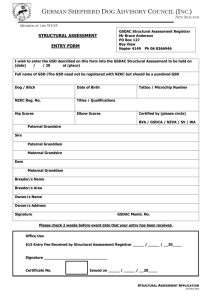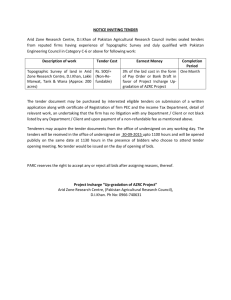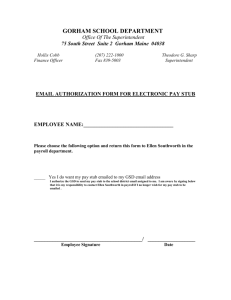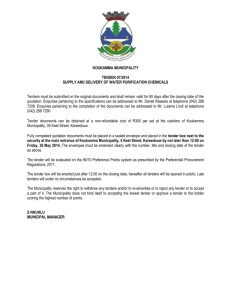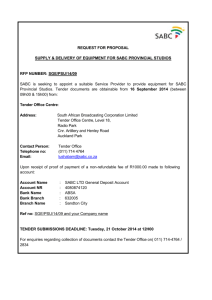Complaint against Government Supplies Department and Hospital
advertisement
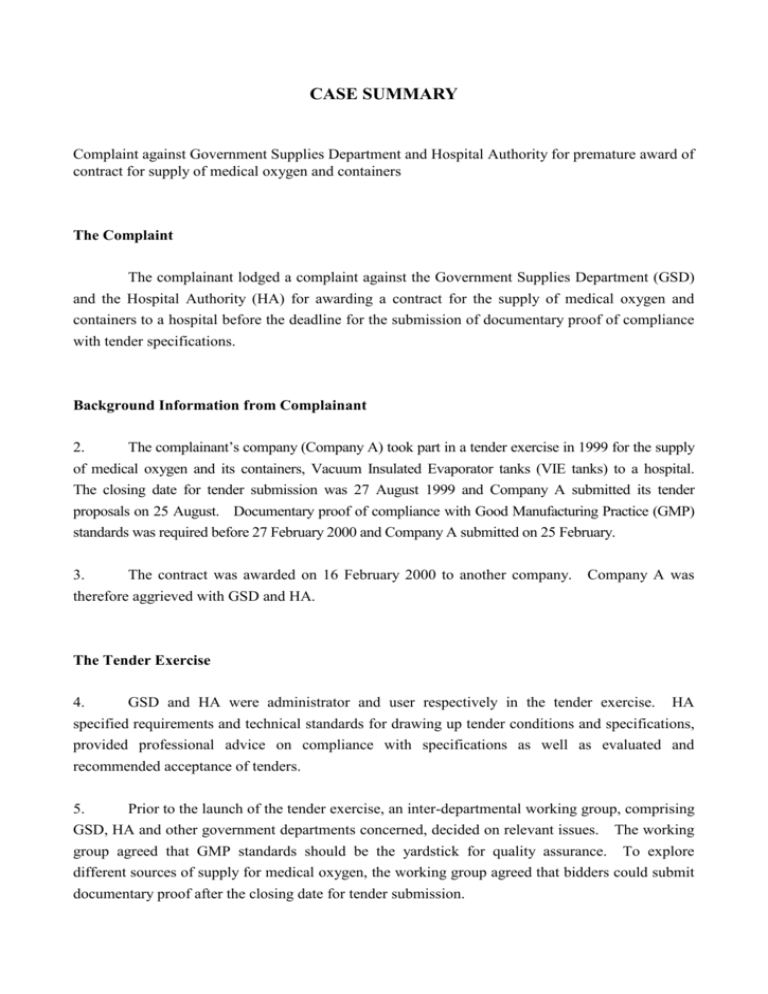
CASE SUMMARY Complaint against Government Supplies Department and Hospital Authority for premature award of contract for supply of medical oxygen and containers The Complaint The complainant lodged a complaint against the Government Supplies Department (GSD) and the Hospital Authority (HA) for awarding a contract for the supply of medical oxygen and containers to a hospital before the deadline for the submission of documentary proof of compliance with tender specifications. Background Information from Complainant 2. The complainant’s company (Company A) took part in a tender exercise in 1999 for the supply of medical oxygen and its containers, Vacuum Insulated Evaporator tanks (VIE tanks) to a hospital. The closing date for tender submission was 27 August 1999 and Company A submitted its tender proposals on 25 August. Documentary proof of compliance with Good Manufacturing Practice (GMP) standards was required before 27 February 2000 and Company A submitted on 25 February. 3. The contract was awarded on 16 February 2000 to another company. Company A was therefore aggrieved with GSD and HA. The Tender Exercise 4. GSD and HA were administrator and user respectively in the tender exercise. HA specified requirements and technical standards for drawing up tender conditions and specifications, provided professional advice on compliance with specifications as well as evaluated and recommended acceptance of tenders. 5. Prior to the launch of the tender exercise, an inter-departmental working group, comprising GSD, HA and other government departments concerned, decided on relevant issues. The working group agreed that GMP standards should be the yardstick for quality assurance. To explore different sources of supply for medical oxygen, the working group agreed that bidders could submit documentary proof after the closing date for tender submission. 2 6. GSD launched the tender exercise in July 1999. Bidders were required to produce a certificate or an audit report confirming compliance with GMP standards issued by any of five designated authorities not later than 27 February 2000. These included the State Drug Administration (SDA) of China and the Department of Health (DH) of Hong Kong. 7. In evaluating Company A’s tender proposals, HA found its certification to be by provincial authorities and not national authorities, i.e. SDA. HA and GSD held a series of discussions with Company A about the certification required. Company A subsequently wrote on 25 January 2000 to say that SDA of China had refused its request for GMP audit. GSD did not respond. 8. The bone of contention in this complaint was the interpretation of the status of certification by the provincial authorities. Company A argued that the power of approving and licensing the manufacture of both liquid and gaseous medical oxygen in the Mainland, where its factory was based, had been delegated to the provincial level. Upon clarification with SDA, HA learnt that SDA was the authority for quality control on and certification of the manufacture of medical oxygen in the Mainland. As such, the certificates issued by the provincial authorities could not be accepted but Company A could approach alternative authorities for GMP certification. 9. To allow sufficient lead time for delivery of VIE tanks before the commissioning of the hospital, GSD and HA awarded the contract on 16 February to the tenderer who had complied with all the requirements. Observations and Opinions 10. While we were not in a position to comment on the merits of the bids, we considered that both GSD and HA contributed to inadequacies of the tender exercise. HA seemed to have been unaware of the unavailability of GMP audit for the manufacture and distribution of medical oxygen by either SDA in the Mainland or DH in Hong Kong. Tenderers who had made unfruitful approaches to these two bodies might not have sufficient time to approach other authorities. In the circumstances, the rigid requirements for certification by the five authorities designated by HA defeated the purpose of the exercise, i.e. to bring in more sources of supply. HA had been deficient in drawing up the specialist tender requirements. GSD also admitted to an oversight as it should have replied to Company A’s letter of 25 January 2000. 11. We fully agree that participants of any tender exercise must observe the rules and comply 3 with the requirements. Company A was rightly obliged to provide proof of full compliance with the tender specifications. It did try. However, apart from SDA and DH, Company A could, and should, have obtained an audit report from other designated authorities. Instead, Company A chose not to explore possibilities fully and insisted on the certification by the provincial authorities, despite advice from HA and GSD. Conclusions 12. Against this background, Company A was itself partly responsible for its unsuccessful bid. 13. Regarding the advance award of contract, GSD and HA explained that there was a need to deliver VIE tanks two months prior to the commissioning of the hospital. Moreover, the documentary proof submitted by Company A on 25 February 2000 was considered unacceptable. However, the fact remained that the deadline for submission of documentary proof was 27 February and tender had been awarded on 16 February. Given Company A’s letter of 25 January 2000 was unanswered, GSD had an obligation to honour the deadline of 27 February 2000. 14. The award of the contract on 16 February 2000 was premature and constituted a breach of the tender conditions. The complaint against GSD and HA was therefore substantiated. Recommendations 15. The Ombudsman had the following recommendations for the Director of Government Supplies and the Chief Executive of HA – For GSD (a) to apologise to the complainant for failure to honour the deadline of 27 February 2000 and reply to his letter of 25 January 2000; and (b) to adopt a pragmatic and realistic approach in setting deadlines for future tender exercises; For HA 4 (c) to review the current arrangements for quality assurance for medical oxygen; and (d) to provide tender specifications with accurate and updated information on designated regulatory authorities. Comments from GSD 16. GSD argued that the complainant had been provided with a verbal response on the spot when he delivered Company A’s letter of 25 January 2000 personally to the Department. Furthermore, Company A was not expected to be able to obtain the required GMP certificate between 16 February and 27 February 2000 and there was an urgent need for the award of the contract to tie in with the construction progress of the hospital. Comments from HA 17. HA maintained that GMP certification was an appropriate and prudent requirement for patients’ health and safety. It maintained that it was right to designate SDA as one of the certifying authorities. Company A could have asked SDA to issue a certificate instead of an audit report, both of which were acceptable. On the other hand, DH would undertake GMP audit of local oxygen manufacturers, although it did not conduct audit of manufacturers outside Hong Kong. 18. According to legal advice obtained by HA, the condition that documentary proof had to be submitted by 27 February 2000 was not a promise in law by GSD or HA to observe the date. Moreover, by early February 2000, it was absolutely clear that Company A would not be able to meet the requirements. Given the tight schedule of the project and concern for patients’ health, the award of the contract on 16 February 2000 was justified. 19. Regarding the two recommendations in para.15(c) and (d), HA said that there was already in place regular reviews on the quality requirements and assurance of pharmaceuticals including medical oxygen while maintaining there was nothing inaccurate or misleading in the conditions of contract. Nonetheless, it undertook to ensure the provision of accurate and updated information in their future tender specifications. Final Remarks from The Ombudsman 5 20. This Office considered GSD’s giving “verbal response on the spot” to be not only imprudent but also contrary to Government’s normal practice for handling correspondence. On “urgency”, we are aware that completion dates of projects are estimated well in advance and any special considerations could, and should, have been taken into account in planning and preparing for the tender exercise. In this context, we found the argument of GSD unconvincing and we still considered it appropriate, and necessary, for GSD to tender an apology as a matter of Government accountability and credibility. 21. We do not dispute the requirements for GMP certification or the authenticity of SDA in its capacity as one of the designated authorities. Nevertheless, the deadline of 27 February 2000 was part and parcel of the tender requirements agreed between HA and GSD in inviting tenders. It was natural, therefore, for prospective bidders to have legitimate expectations of that deadline being observed. 22. We were pleased to note that relevant regular reviews were already conducted by HA. Such good practice should continue. 23. Having carefully considered the comments from GSD and HA, The Ombudsman remained of the view that the case was substantiated. In the interest of administrative fairness, GSD and HA should work together to implement the recommendations in para.15. Office of The Ombudsman Ref : OMB 2000/1432-1433 September 2001
